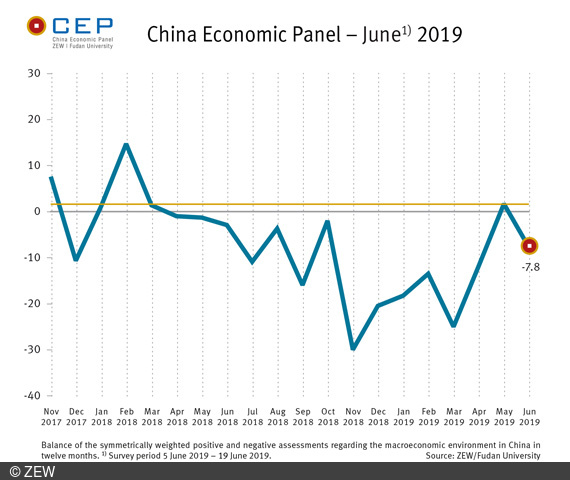Expectations for Chinese Economy Return to Negative Territory
China Economic PanelCEP Indicator Falls to a New Reading of Minus 7.8 Points
According to the most recent survey for June (5–19 June 2019), the economic outlook for China has decreased by 9.5 points to a reading of minus 7.8 points. The indicator thus finds itself once again in negative territory (May 2019: 1.7 points). The CEP Indicator, which reflects the expectations of international financial market experts regarding China’s macroeconomic development over the coming twelve months, has thus been experiencing an almost uninterrupted series of negative readings since April 2018. May 2019 was the only month in which the indicator moved into slightly positive territory for a short period of time.
The assessment of the current economic situation has improved slightly, with the corresponding indicator climbing 2.1 points to a current reading of minus 9.6 points. The expectations for the current situation have thus not been in positive territory since November 2018.
The point forecasts for real gross domestic product (GDP) growth has remained virtually unchanged compared to last month’s forecasts, with experts expecting China’s economic growth to slow down to 6.0 per cent in the upcoming year.
The strong increase in the expectations regarding private investments (June: 8.3 points, May: minus 5.4 points) shows that the respondents believe that the active economic policy measures by the Chinese government are likely to have a positive effect on business investments. The expectations regarding future private consumption have also increased by 4.8 points to 6.6 points.
“The overall negative assessment of the economic outlook for the coming twelve months has consequences for the major economic regions. With the exception of Chongqing, all regions received a less positive assessment of economic growth compared to the previous month. With regard to the expectations for Hong Kong, it is remarkable that the current mass protests against the extradition bill that would allow people to be sent to (mainland) China and the increased political uncertainty have so far not lead to a deterioration in economic expectations,” concludes Dr. Michael Schröder, senior researcher in the Research Department “International Finance and Financial Management” at the ZEW – Leibniz Centre for European Economic Research and project leader of the CEP survey.
